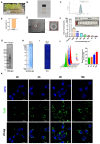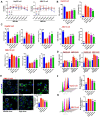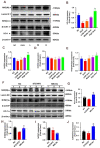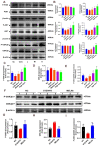Natural exosomes-like nanoparticles in mung bean sprouts possesses anti-diabetic effects via activation of PI3K/Akt/GLUT4/GSK-3β signaling pathway
- PMID: 37759297
- PMCID: PMC10536756
- DOI: 10.1186/s12951-023-02120-w
Natural exosomes-like nanoparticles in mung bean sprouts possesses anti-diabetic effects via activation of PI3K/Akt/GLUT4/GSK-3β signaling pathway
Abstract
Background: Type 2 diabetes mellitus (T2DM) is a chronic metabolic disease characterized by hyperglycemia and insulin resistance. Mung bean sprouts are traditionally considered a "folk" hypoglycemic food and their pharmacological effects and underlying mechanisms warrant further investigation.
Purpose: This study aimed to investigate the anti-diabetic effects of the exosomes-like nanoparticles in mung bean sprouts (MELNs) and explore the related molecular mechanisms.
Results: MELNs were isolated using a differential centrifugation-polyethylene glycol (PEG) method, and the identification of MELNs were confirmed by PAGE gel electrophoresis, agarose gel electrophoresis, thin-layer chromatography (TLC), and transmission electron microscopy (TEM). In the high-fat diet/streptozotocin (HFD/STZ) mouse model, MELNs ameliorated the progression of T2DM by increasing oral glucose tolerance test (OGTT) and insulin tolerance test (ITT) results, decreasing the fasting blood glucose level, and reducing the serum triglycerides (TG) and total cholesterol (TC). Histopathological examinations indicated MELNs diminished inflammatory infiltration of hepatocytes and amplified the area of islet B cells. In addition, MELNs decreased the oxidative stress levels in liver tissue and had good biocompatibility. In vitro experiments verified that MELNs improved the viability of glucosamine (GlcN) induced insulin-resistant hepatocytes. Furthermore, this study also revealed that MELNs upregulated GLUT4 & Nrf2 and down-regulated GSK-3β via activating the PI3K/Akt signaling pathway, promoting the production of antioxidant enzymes, such as HO-1 and SOD, to reduce oxidative stress.
Conclusion: MELNs mitigated the progression of type 2 diabetes in HFD/STZ mouse model. The underlying molecular mechanism is related to PI3K/Akt/GLUT4/GSK-3β signaling pathway.
Keywords: Exosome-like nanoparticles; Mung bean sprouts; Oxidative stress; Type 2 diabetes Mellitus.
© 2023. BioMed Central Ltd., part of Springer Nature.
Conflict of interest statement
The authors declare no competing interests.
Figures










References
-
- Ogurtsova K, Guariguata L, Barengo NC, Ruiz PL, Sacre JW, Karuranga S et al. IDF diabetes Atlas: Global estimates of undiagnosed diabetes in adults for 2021, Diabetes Res Clin Pract. 2022; 183:109118.10.1016/j.diabres.2021.109118. - PubMed
-
- Kazda CM, Ding Y, Kelly RP, Garhyan P, Shi C, Lim CN et al. Evaluation of Efficacy and Safety of the Glucagon Receptor Antagonist LY2409021 in Patients with Type 2 Diabetes: 12- and 24-Week Phase 2 Studies, Diabetes Care 39(7) (2016) 1241 – 9.10.2337/dc15-1643. - PubMed
MeSH terms
Substances
Grants and funding
- 2021MS464/Sichuan Provincial Administration of Traditional Chinese Medicine
- 2021MS464/Sichuan Provincial Administration of Traditional Chinese Medicine
- 2021MS464/Sichuan Provincial Administration of Traditional Chinese Medicine
- 2021MS464/Sichuan Provincial Administration of Traditional Chinese Medicine
- 2021MS464/Sichuan Provincial Administration of Traditional Chinese Medicine
- 2021MS464/Sichuan Provincial Administration of Traditional Chinese Medicine
- 2021MS464/Sichuan Provincial Administration of Traditional Chinese Medicine
- 2021MS464/Sichuan Provincial Administration of Traditional Chinese Medicine
- 2021MS464/Sichuan Provincial Administration of Traditional Chinese Medicine
- 2021MS464/Sichuan Provincial Administration of Traditional Chinese Medicine
- 2021MS464/Sichuan Provincial Administration of Traditional Chinese Medicine
LinkOut - more resources
Full Text Sources
Medical
Miscellaneous

